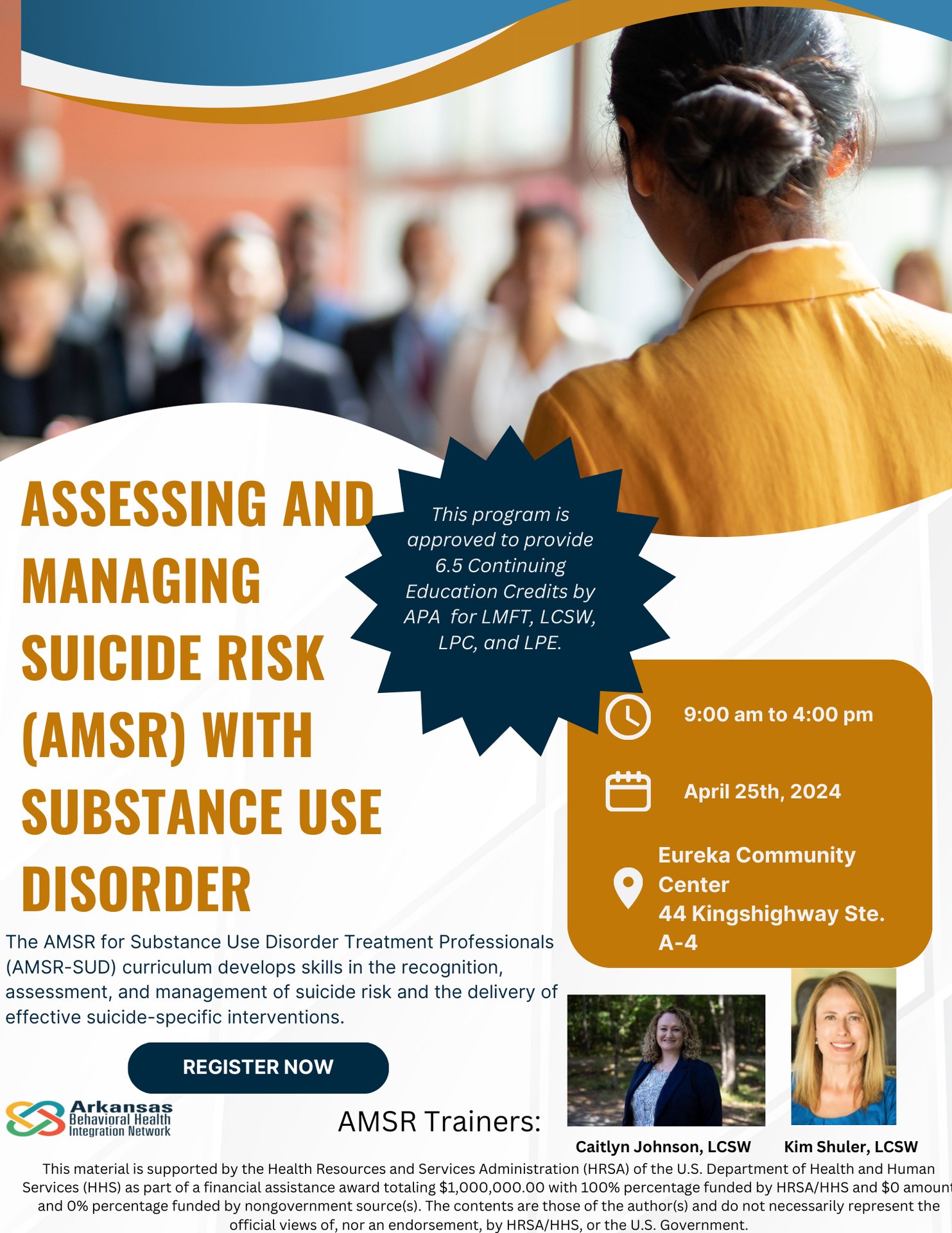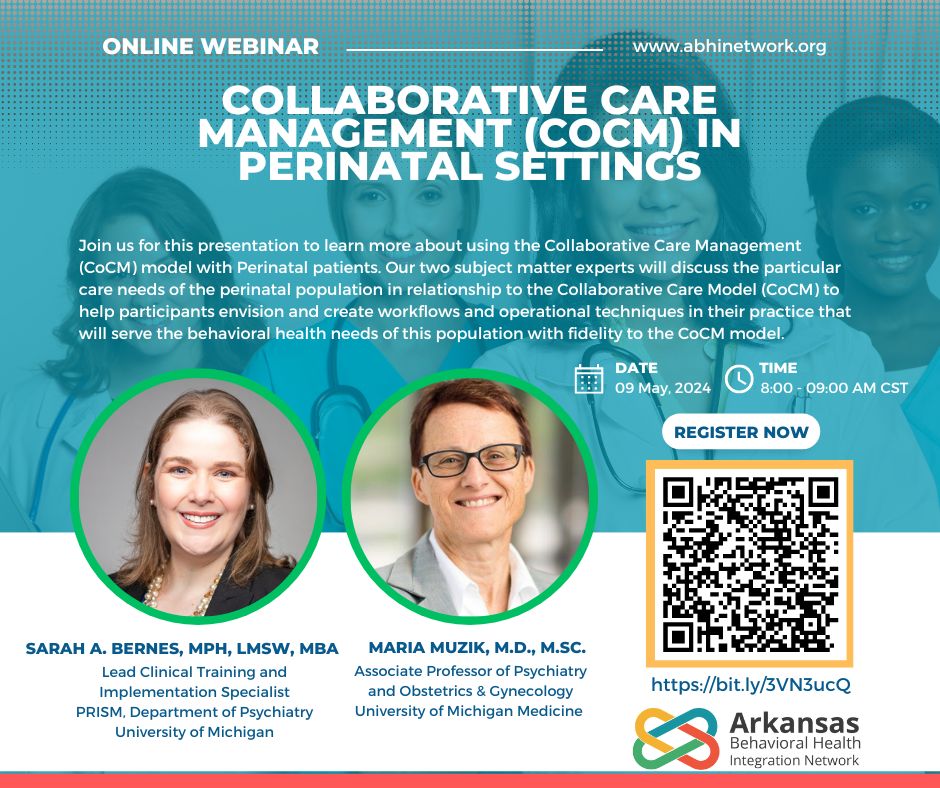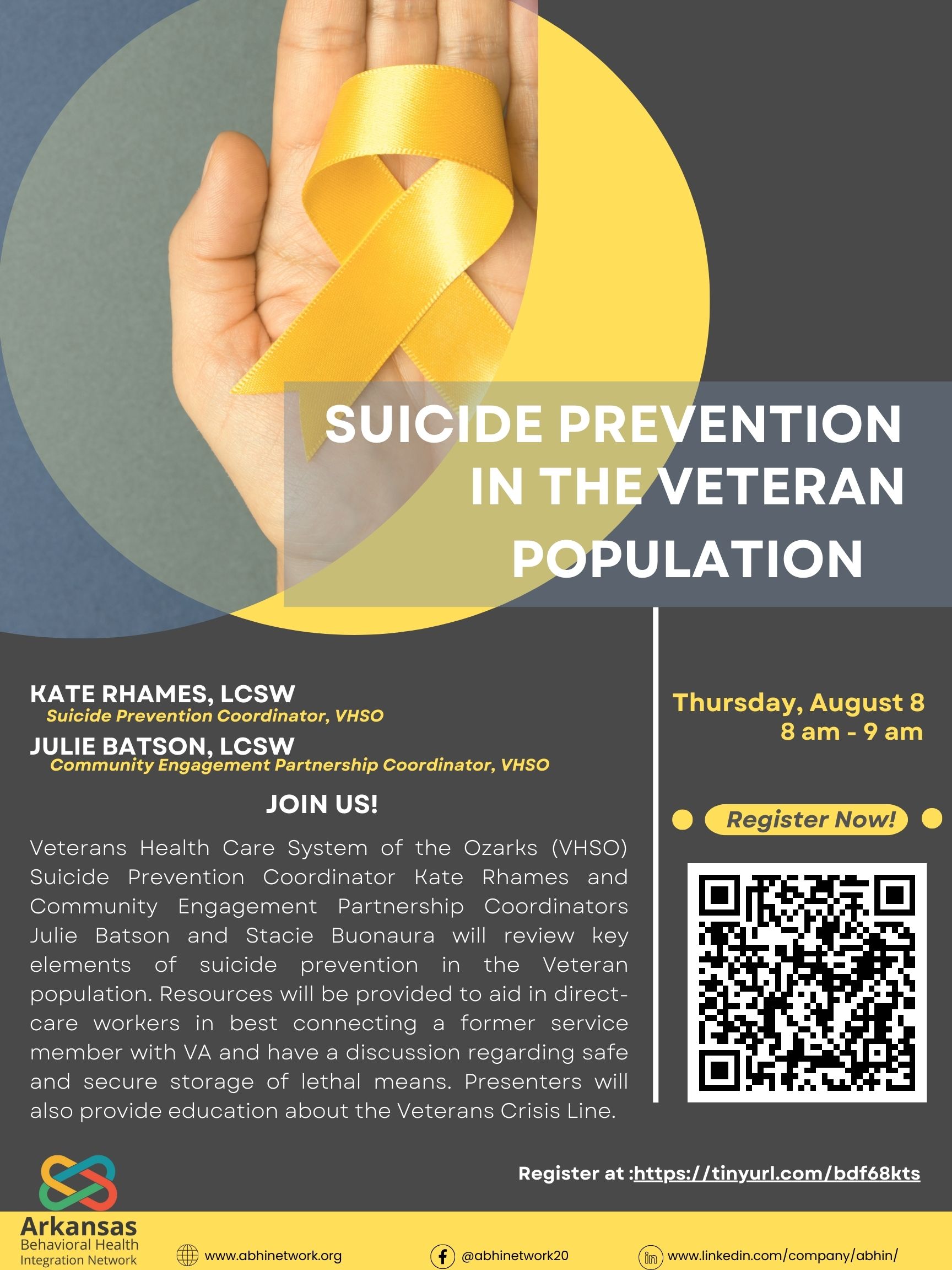Assessing and Managing Suicide Risks (AMSR) with Substance Use Disorder
ABHIN Office 44 Kingshighway, Suite A-4, Eureka Springs, ArkansasThe AMSR for Substance Use Disorder Treatment Professionals (AMSR-SUD) curriculum develops skills in the recognition, assessment, and management of suicide risks and the delivery of effective suicide-specific interventions. This program is approved to provide 6.5 Continuing Education Credits by APA for LMFT, LCSW, LPC, and LPE.
Collaborative Care Management in Perinatal Settings
Join us for this presentation to learn more about using the Collaborative Care Management (CoCM) model with Perinatal patients. Our two subject matter experts will discuss the particular care needs of the perinatal population in relationship to the Collaborative Care Model (CoCM) to help participants envision and create workflows and operational techniques in their practice that will serve the behavioral health needs of this population with fidelity to the CoCM model. 1 CEU/CME is pending approval.
Addressing Behavioral Health Needs Through SDOH Strategies
Learn how SDOH needs impact behavioral health needs and vice versa. Learn about the stigma associated with SDOH and how integrating a humanistic approach can increase patient disclosure. Learn about the roles of the care team in addressing SDOH. Learn about the roles of the care team in addressing SDOH.
Addiction-Related Substances and What to Do About Them
Join us for Dr. Jim Shuler’s insightful presentation on 'Addiction-related Substances and What to Do About Them.' This lecture will delve into the comprehensive treatment of Substance Use Disorders (SUD), offering a nuanced understanding of general treatment approaches. Dr. Shuler will explore the distinctive behavioral aspects and unique considerations for medical interventions across major drug groups such as alcohol, cannabinoids, dissociates/hallucinogens, nicotine, opioids, sedative-hypnotics, and stimulants, shedding light on effective strategies for managing and overcoming addiction.
Addressing Chronic Disease Through SDOH Strategies
Identify key Social Determinants of Health that directly influence the prevalence and management of chronic diseases, emphasizing the roles of housing, nutrition, and access to healthcare. Develop and propose targeted interventions that leverage SDOH insights to improve chronic disease outcomes in diverse populations, focusing on evidence-based practices and community partnerships. Evaluate the impact of integrating SDOH-focused strategies into healthcare systems on the management and prevention of chronic diseases, with an aim to formulate scalable and sustainable health policies.
In Context: Digital Solutions for Integrated Behavioral Health
This presentation will seek to provide a conceptual overview of how practitioners may evaluate the utility of specific digital tools and interventions within a particular healthcare setting and context. Review of digital therapeutics and other types of digital solutions to support population behavioral health will attempt to provide context on best practices and common pitfalls of attempting to implement digital solutions.
Suicide Prevention in the Veteran Population
Veterans Health Care System of the Ozarks (VHSO) Suicide Prevention Coordinator Kate Rhames and Community Engagement Partnership Coordinators Julie Batson and Stacie Buonaura will review key elements of suicide prevention in the Veteran population. Resources will be provided to aid in direct care workers in best connecting a former service member with VA and have a discussion regarding safe and secure storage of lethal means. Presenters will also provide education about the Veterans Crisis Line.
Clinical Pathways in Collaborative Care Management
This presentation will focus on the role of clinical pathways in implementing and growing a Collaborative Care Management (CoCM) program. Developing Clinical Pathways in CoCM allows primary care practices to better manage a population of patients with behavioral health diagnoses and offers a system to identify patients, treat patients, monitor symptoms, adjust treatment as needed, and track outcomes. Participants will leave the session understanding how to create, utilize, and optimize clinical pathways in their practice.
Social Drivers of Health Screening: Claims-Based Data Solutions Through HCPCS and ICD Code Documentation
This presentation delves into the integration of Social Drivers of Health (SDOH) screening in healthcare practices. Participants will learn about the SDOH screening workflows in clinic and hospital settings, identify opportunities for improving the efficiency of charge coding based on SDOH data, and gain insights into addressing social risks through precise diagnosis coding. The session aims to enhance understanding of SDOH screening processes and leverage claims-based data solutions to optimize healthcare delivery and intervention strategies.
Substance Use in Adolescence: An overview of current trends and treatment strategies
There is a significant gap in the understanding of substance use disorders in adolescents. In our November webinar, Dr. Srinivasa Gokarakonda will provide education on the current trends of teen substance use and various evidence-based treatment strategies. In addition to reviewing the epidemiology of SUD in adolescents, the presentation will provide an overview of Screening, Brief Intervention, and Referral to Treatment (SBIRT) and explore prevention strategies and evidence-based treatments for SUDs in adolescents.
Bridging Practice and Policy: Woven Clinics’ Journey in Behavioral Health Integration
Join us this February for a webinar highlighting the innovative contributions of early career psychiatrists in advancing integrative mental health care through the Collaborative Care Model (CoCM). Learn how their advocacy and practical strategies are breaking down barriers to implementing CoCM and driving systemic change. Explore real-world examples and insights on turning challenges into opportunities for professional growth and policy impact.
Building the Future of BHI: Education as a Pathway to Workforce Sustainability
This webinar will provide information on the third year of the Behavioral Health Integration Bootcamp program. Featuring the work of students from the University of Arkansas at Little Rock, we will discuss the latest student interventions, data trends, and hear from providers on the integration of students into their primary care practices. After the brief presentation, the students will share their insights on integration, their unique internship experiences, and much more. Don’t miss this informative session! One CEU/CME will be available to participants.














